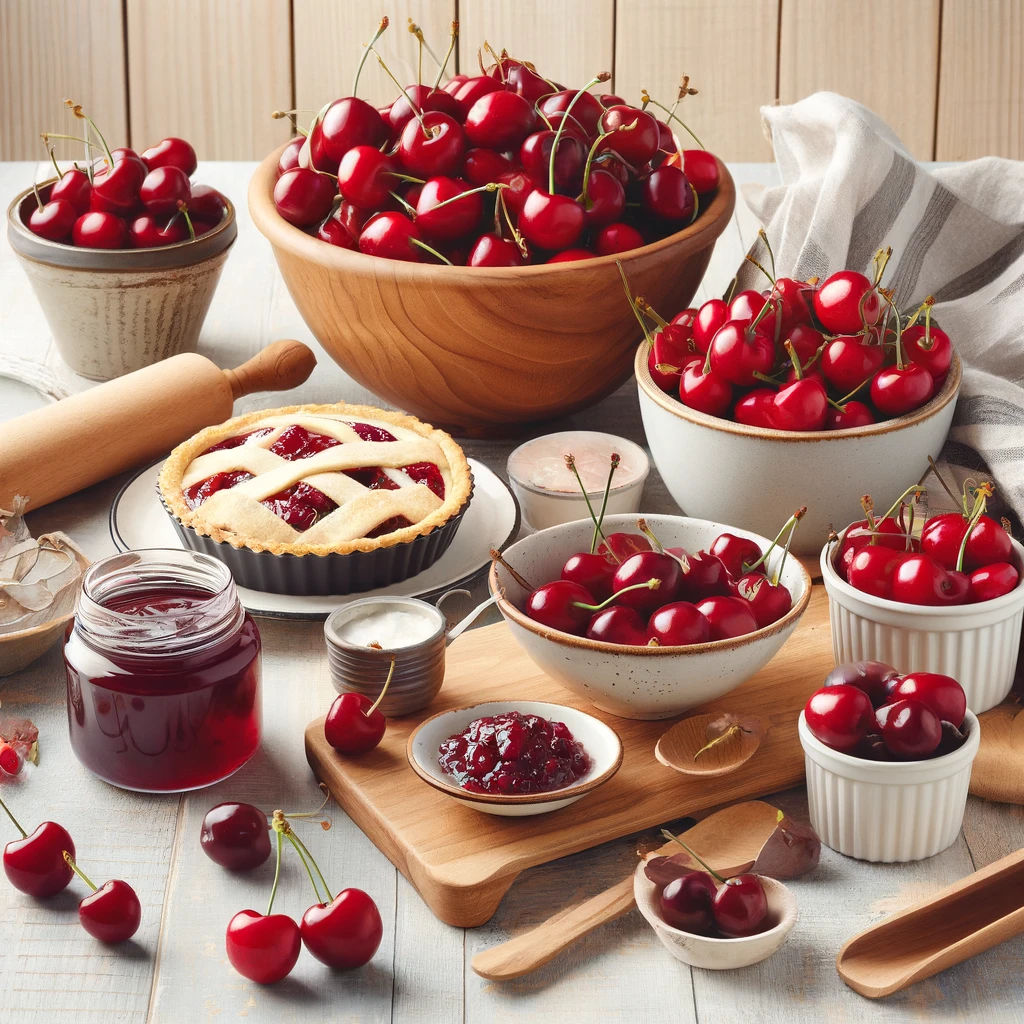reliable food sales
Cherries
Cherries
Couldn't load pickup availability
Cherries are small, round stone fruits known for their juicy, sweet-tart flavor and vibrant red or dark purple color. Cherished for their delicious taste and numerous health benefits, cherries are enjoyed fresh, dried, or used in a variety of culinary applications, from desserts and beverages to savory dishes.
What are Cherries? Cherries (Prunus avium for sweet cherries and Prunus cerasus for sour cherries) grow on deciduous trees and are part of the Rosaceae family, which also includes plums, apricots, and almonds. There are two main types of cherries: sweet cherries, often eaten fresh, and sour cherries, typically used in cooking and baking.
Nutritional Profile:
- Vitamins and Minerals: Cherries are an excellent source of vitamin C, potassium, and dietary fiber. They also provide small amounts of vitamin A, vitamin K, and several B vitamins.
- Antioxidants: Rich in antioxidants such as anthocyanins and quercetin, cherries help combat oxidative stress and inflammation.
- Low in Calories: Cherries are relatively low in calories, making them a healthy addition to any diet.
Types of Cherries:
- Sweet Cherries: Varieties such as Bing, Rainier, and Lambert are popular for their sweet, juicy flavor. They are typically eaten fresh but can also be used in desserts and salads.
- Sour Cherries: Varieties like Montmorency and Morello have a tart flavor and are commonly used in baking, cooking, and preserving. They are ideal for making pies, jams, and sauces.
Uses in Culinary Applications:
- Fresh Eating: Sweet cherries are perfect for snacking and can be enjoyed fresh, right off the stem. They can also be added to fruit salads and cheese platters.
- Baking: Cherries are a popular ingredient in baked goods, including pies, tarts, cakes, muffins, and breads. Sour cherries are especially prized for their flavor in pies and pastries.
- Cooking: Cherries can be used in savory dishes, adding a sweet-tart contrast to meats, salads, and grain dishes. They pair well with ingredients like duck, pork, and goat cheese.
- Preserves: Cherries are excellent for making jams, jellies, and preserves, capturing their sweet-tart flavor for year-round enjoyment.
- Beverages: Cherries can be juiced or blended into smoothies, cocktails, and sodas. They also make a delicious addition to sangria and fruit punches.
- Dried Cherries: Dried cherries are a convenient snack and can be added to trail mixes, granola, baked goods, and salads.
Health Benefits:
- Anti-Inflammatory Properties: The antioxidants in cherries, particularly anthocyanins, have anti-inflammatory effects that can help reduce the risk of chronic diseases.
- Heart Health: Cherries are rich in potassium, which helps regulate blood pressure, and fiber, which supports heart health by lowering cholesterol levels.
- Sleep Aid: Cherries contain melatonin, a natural hormone that helps regulate sleep cycles, making them a good snack for promoting better sleep.
- Pain Relief: The anti-inflammatory and antioxidant properties of cherries may help reduce muscle soreness and joint pain.
- Digestive Health: The fiber in cherries supports healthy digestion and regular bowel movements.
How to Use:
- Fresh: Rinse cherries thoroughly and enjoy them fresh as a snack. They can also be pitted and added to salads or desserts.
- Baking: Use pitted cherries in pies, tarts, cakes, and muffins. Combine with sugar and spices like cinnamon or nutmeg for added flavor.
- Cooking: Incorporate cherries into savory dishes by adding them to sauces, salads, and grain bowls. They pair well with herbs like thyme and rosemary.
- Preserving: Make cherry jam, jelly, or compote by cooking cherries with sugar and pectin. Can the preserves for long-term storage.
- Beverages: Blend cherries into smoothies, juices, or cocktails. Add fresh or dried cherries to sangria or sparkling water for a fruity twist.
Storage: Store fresh cherries in the refrigerator, unwashed, in a breathable container or plastic bag. Rinse just before eating. Dried cherries should be kept in an airtight container in a cool, dry place. For longer storage, cherries can be frozen after pitting.
Cherries are a versatile and nutritious fruit that add a burst of flavor and color to a variety of dishes. Their sweet-tart taste, combined with numerous health benefits, make them a delightful and healthful addition to any diet.
Share



